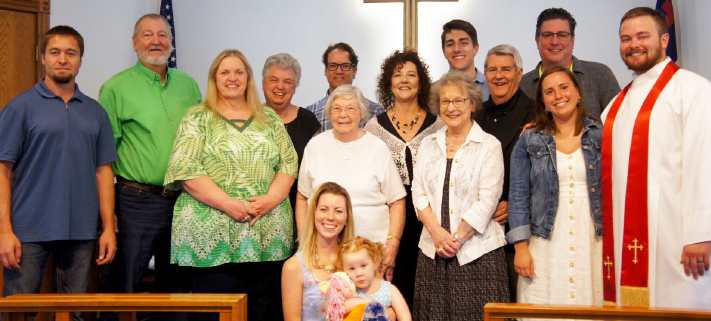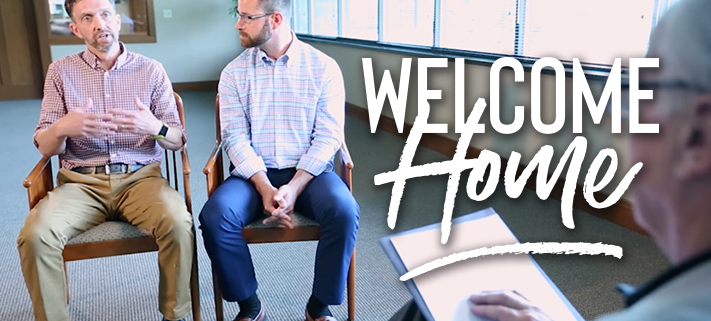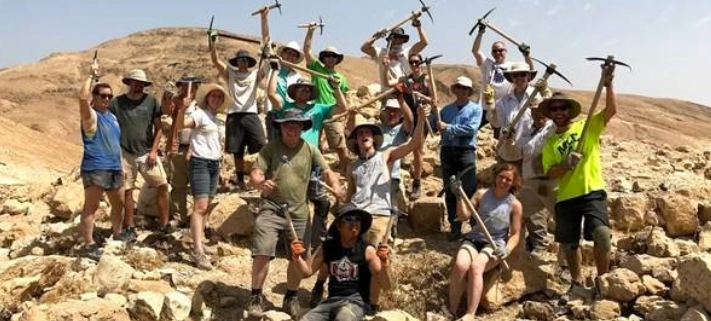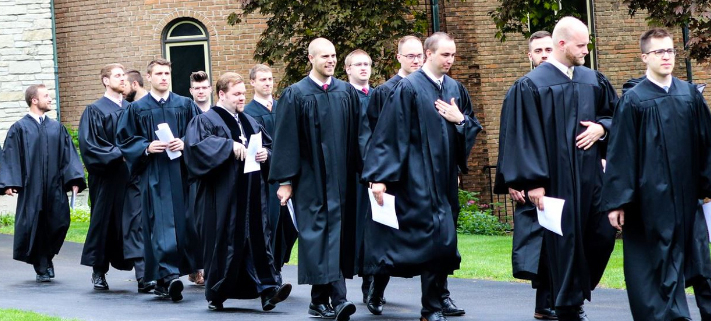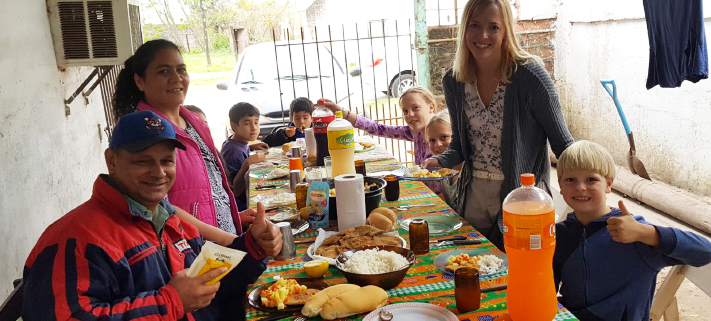Jesus reminds us to pray for more workers in his harvest of souls.
John A. Braun
Northwestern Publishing House hosts a luncheon every spring honoring graduates of Wisconsin Lutheran Seminary, Mequon, Wis. I sat with six men who would be assigned to begin their service as pastors.
Earlier I had just heard a report that we have 121 full–time parish pastor vacancies and 26 seminary graduates. I know that interpreting those numbers depends on a number of factors. As it turned out, 30 men were assigned. Added to these graduates were four from previous classes. I remembered Lord’s words, “The harvest is plentiful but the workers are few” (Matthew 9:37). Those words flowed from his compassion for the crowds “harassed and helpless, like sheep without a shepherd” (v. 36). He saw the need and, it seemed clear to me, that the need has not disappeared.
I decided to spend a few minutes with these six men to explore what motivated them to begin training for the pastoral ministry. So I asked them. I only said that they could not take the easy way out of my question. They could not say that the Holy Spirit led them to become pastors. Not only is that an easy pat answer, but it is also true for all of them, all who are serving today, and all who are still preparing to serve.
My goal was simple. I wanted to share their stories in the hope that others would pause and think about serving as pastors.
The first to respond was Aaron Platzer. He began, “I attended public school.” Then I asked what led him to want to be a pastor. His simple answer was, “My pastor!” In many ways the pastors who serve our congregations now are key to finding more workers for the harvest. Aaron went on, “He confirmed me and encouraged me. I didn’t think much about it in high school. But he kept encouraging me and then when I was thinking about college, he thought I should give Martin Luther College (MLC) a try. So I did.”
Tristan Paustian graduated from Shoreland Lutheran High School, Somers, Wis. He, like some of the others I talked to that day, has a family filled with called workers. But he said, “I didn’t want to be a pastor. I wanted to do something else with my life. I thought I could serve God in another way.” His family understood. He ended up going to MLC in order to be a teacher. But in his second year, he decided to shift from the teacher track to pastor track. The pastors in his family were the quiet and persistent model he chose to follow.
Nathanael Jensen had an easy answer, “I remember that from kindergarten, I always wanted to be a pastor. My father was my role model. I never wanted to do anything else.” His father is a pastor in Watertown, Wisconsin. Nathanael quite naturally attended Luther Preparatory School (LPS) in Watertown and then went on to MLC and the seminary. I know that some young men echo Nathanael’s words. Some see their fathers as role models, but others have found role models in the pastors that confirmed them. In all of these six cases, their families encouraged them along the way.
Hans Thomford attended Michigan Lutheran Seminary (MLS) in Saginaw for high school. He said that he saw himself as a vet, farmer, or engineer. At MLS he received support to think about pursuing the pastoral ministry. “I got encouragement from the teachers and especially the tutors. I had so many experiences which led me to head to MLC and try it for a year,” he said. “After I had one year in at MLC, I knew this was something I wanted to do full-time in my life and for the Lord. I don’t think you get that kind of encouragement anywhere else.” His father, a pastor, was a great influence in encouraging him to pursue serving the Lord as a pastor.
Dan Rodewald attended LPS. He also received encouragement from his family and especially from the tutors in the dormitory and the teachers in the classroom. “I really appreciated all the emphasis on ministry I got at LPS from everyone there,” he says. But he still was not sure, even though he went on to MLC. He still had doubts at the seminary. Then he was assigned as a vicar, where he worked under the supervision of a pastor in his congregation. Dan said, “I remember talking with one man and sharing the comfort of the gospel with him. He died a few hours later. I was the last person to talk with him. I knew then that I was sure I wanted to be a pastor.”
Only one of these young graduates was left, Tim Priewe. He went to Wisconsin Lutheran High School (WLHS) in Milwaukee but had no inclination or plans to be a pastor because he was always on the quieter side. Unlike the others, there was no pastor in his family, but he grew up with the example of the dedicated service of his parents in their church. When he came to WLHS, he decided to take Latin because his brother had taken it. When his first year was over, he chose a second year of Latin. His sister, who already was at MLC, convinced him to stick it our for the third and finally a fourth year. He also began meeting with MLC recruiters. At graduation he applied to only one college, MLC, and enrolled in the pastor track.
I decided to ask them all one more question, “What do you tell people who want to know why you want to be a pastor?”
Dan answered by returning to the story from his vicar year. “I tell them that I want to share the message of the gospel. That’s the bottom line. I like to use that question to tell people law and gospel and share.”
The others all agreed.
Aaron added, “When some of my high school friends and family ask why I want to be a pastor, they see the eight years of study and then the salary and wonder why you spent all that time to be a pastor. They only see the money and the time. But it’s like Dan said, it’s sharing the gospel that’s most important.”
Now I think of the congregations and the people they will serve. I look beyond those congregations to see the crowds like Jesus did. I see a world in need of what we all treasure—Jesus and his gifts of forgiveness and eternal life. And I pray, “Lord, send workers into the harvest.”
Then I also begin to look for students who have the ability and the inclination to serve as pastors or teachers. The harvest remains plentiful, and we all need to pray for workers and then actively encourage those we know to pursue training for the public ministry.
John Braun is executive editor of Forward in Christ magazine.
By the numbers
30→Men who received assignments into the pastoral ministry this year, including the six seniors interviewed in the article.
6→Pastor assignments made to U.S. home mission fields
60→Requests made by congregations, schools, and other ministries for a pastor, 30 of which went unfilled.
104→Synodwide vacancies for pastor-trained men after assignments, 90 of which are for parish pastors.
47→Men who graduated from MLC’s preseminary program in 2019, the largest class since ??
124→Anticipated enrollment at WLS for the upcoming 2019–20 school year, up from 110 for the 2018–19 school year.
Did you know?
A ninth-grader who begins his pastoral education this fall will not be ordained as a pastor until 2031.
Where they went
Nathanael J. Jensen to Michigan Lutheran Seminary, Saginaw, Mich.*
Tristan D. Paustian to Bethlehem, Hortonville, Wis.*
Aaron J. Platzer to Peace, Loves Park, Ill.*
Timothy T. Priewe to associate for the Northern Wisconsin district president at Mount Olive, Appleton, Wis.*
Daniel L. Rodewald to Paradise Valley, Phoenix, Ariz.*
Hans J. Thomford to Martin Luther College, New Ulm, Minn.*
*Read the complete assignment list at wls.wels.net/about-wls/assignment-list/
Did you know?
Pastoral candidates can receive a variety of assignments, from serving at self-supporting congregations to starting new home or world mission fields. Each year, several graduates also are temporarily assigned to Martin Luther College and WELS’ two preparatory high schools, Luther Preparatory School, Watertown, Wis., and Michigan Lutheran Seminary, Saginaw, Mich. They will teach, coach, supervise, mentor, and encourage young adults as they prepare for the gospel ministry. Some graduates become associates to district presidents, allowing the district presidents the time they need to travel and serve in their districts, as well as fulfill their role as members of the Conference of Presidents.
What can I do?
→Pray for more workers
→Identify young people you know who might make a good pastor, teacher, or staff ministry. Encourage them to consider the ministry.
→Submit names of possible candidates to Martin Luther College at mlc-wels.edu/go/recommend. MLC will ask permission to send the student information so they can consider ministerial training for their future.
→Support current ministerial education students from your congregation. Pray for them. Send them cards and care packages. Ask them about their classes when you see them.
A prayer for more workers
Lord of the harvest, give your church men and women who are eager to prepare for service in your kingdom. Help me to encourage not only my own pastor(s) and teachers but also to encourage young men and women I think have the gifts to train for ministry.
In your name,
Amen.
Do you have a manuscript, idea, or story from your own life you’d like to share for use in Forward in Christ or on wels.net? Use our online form to share it to our editorial office for consideration.
Get inspirational stories, spiritual help, and synod news from Forward in Christ every month. Print and digital subscriptions are available from Northwestern Publishing House.
Author: John A. Braun
Volume 106, Number 8
Issue: August 2019
Copyrighted by WELS Forward in Christ © 2021
Forward in Christ grants permission for any original article (not a reprint) to be printed for use in a WELS church, school, or organization, provided that it is distributed free and indicate Forward in Christ as the source. Images may not be reproduced except in the context of its article. Contact us

